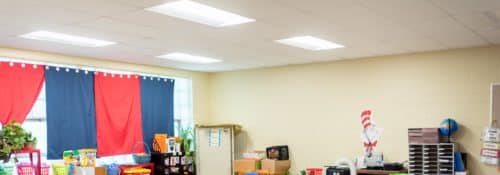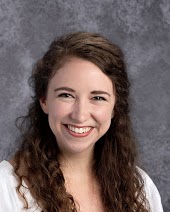
BCSI Teacher Spotlight: Elizabeth Offord
Elizabeth Offord teaches the second grade and directs theater for the middle school and high school students at Northwest Arkansas Classical Academy in Bentonville, Arkansas. She works there with her husband, Jeff Offord, who teaches high school math and physics.
 Please tell us about your background:
Please tell us about your background:
I attended Southwest Baptist University, where I received a degree in elementary education and childhood development. I began working at Northwest Arkansas Classical Academy right after I graduated, in 2014, and have been there ever since.
How did you and your husband meet?
We met in high school, when we were 16. He sat behind me in geometry.
What does classical education look like for you?
The most important aspect of classical education in second grade is laying the groundwork for great thinking. We are, of course, in the grammar stage, so there’s an emphasis in acquiring foundational knowledge, but more than that, what I love is the room for structured dialogue around the content. People don’t believe second graders can sit and listen to a lecture and then have an open class discussion, but it’s truly beautiful and astonishing to see a room full of children sharing ideas with the whole class comfortably. It often makes me think of a college classroom: it’s relaxed, it’s challenging, and it’s intentional.
What is your favorite book, thinker, or concept to teach to your students and why?
This changes every year, depending on the class and their reaction to the content. Different units impact each class in unique ways. With one class, Beauty and the Beast became our favorite story because it defined beauty for them in a way that they could apply all year long. When we read about Florence Nightingale, without seeing her picture, they exclaimed, “She’s beautiful!” With one class it was the Civil Rights movement—when they heard “I Have a Dream,” they stood and solemnly put their hands over their hearts without a word. This year when my students heard the Greek myth Daedalus and Icarus, they silently cried afterwards. When they found the words to speak, they said it was the first time they’d heard a sad ending, and they didn’t know what to do with the sadness. When Peter Pan is willing to die to save Wendy, when Abraham Lincoln speaks words of healing through the Gettysburg Address, when Harriet Tubman bravely risks her life—it changes my students, and it changes me, again and again. Every year it’s the same lessons, but it feels new.
What has surprised you most about teaching?
I am most surprised by how just being present and calm can make a room full of energetic children want to be present and calm with you. When you first start teaching, it feels unattainable to have a peaceful classroom where eager learning takes place. But it’s simpler than you think, and it doesn’t take a harsh word—it takes a sincere, kind word to draw their attention and hold it.
How have you adjusted to online teaching? What can be maintained and what is lost through this new medium?
I miss my students terribly—all those spontaneous moments felt lost at first. As we’ve continued on though, seeing their faces in Google Classroom, we still have moments of beauty. We are reading Stuart Little right now, and one boy exclaimed to us all that he can play the “Scarf Dance” on the piano (which is mentioned in the book). I invited him to show us then and there, so he did. That spurred on another child to play a song for us, and we discussed the humorous idea of a little mouse running around inside a piano, lifting the felt hammers, with giggles and joy. The biggest difference is you can’t have the moments of quiet consideration over the very serious and impactful things we learn together. I miss the rhythm of our days.